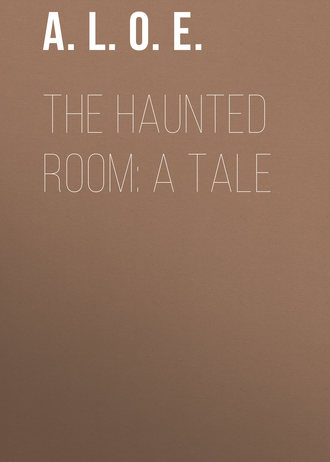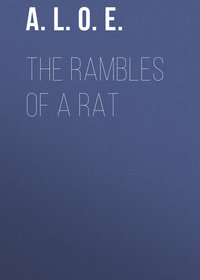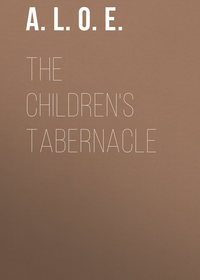 полная версия
полная версияThe Haunted Room: A Tale
“Oh, then you only mean that I am a little timid and nervous,” said Emmie, a good deal relieved. “That is no serious charge; you let me off too easily.”
“Not so fast, my dear child. Let us examine the allegorical personages more closely. Timorous and Mistrust are not only found together, but they are very closely related.”
“You would not have me a Boadicea or a Joan of Arc?” asked Emmie, smiling.
“I would have you – what you are – a gentle English maiden; but I would have you more than you now are, – that is to say, a trustful Christian maiden,” replied Captain Arrows.
“Surely courage is a natural quality, which belongs to some and not to others,” observed Emmie Trevor. “Besides, if it be a virtue at all, it is surely a man’s rather than a woman’s.”
“Mere physical courage, such as ‘seeks the bubble reputation e’en in the cannon’s mouth,’ is not a Christian virtue,” said the captain; “it may be displayed by infidel or atheist. The courage which is a grace, a grace to be cultivated and prayed for, is that childlike trust in a Father’s wisdom and love, by which the feeblest woman may glorify her Maker.”
“Faith in God’s wisdom and love! Oh, you do not surely think that I am so wicked as ever to doubt them! I have many faults, I know, but this one – ” Emmie stopped short, startled to find on her tongue almost the very words which had been given as a sign that the bosom sin had been tracked to its lurking-place.
“You remember,” said Captain Arrows, “that a few days ago I listened to your singing that fine hymn which begins with the lines, —
‘Lord, it belongs not to my care
Whether I die or live.’”
“Yes,” replied Emmie Trevor; “and you told me that, much as you admired that hymn, you did not think it suited for my singing. I supposed that you thought it too low for my voice.”
“No, I thought it too high for your practice. Could it be consistently sung by one who that morning had been in nervous terror at the scratch of a kitten; one who owned that she would scarcely dare to nurse her best friend through the small-pox; one who, even with my escort, could not be persuaded to cross a field in which a few cows were grazing?”
“Oh, uncle, how can you take such trifles seriously!” cried Emmie, a good deal hurt.
“Because I wish you to take them a little more seriously,” replied Captain Arrows. “You have hitherto regarded unreasonable fear as an innocent weakness, perhaps as something allied with feminine grace, and not as a foe to be resisted and conquered. I see that fear is at this time throwing a shadow over your path; that you would be happier if you had the power wholly to cast it aside.”
“I have not the power,” said Emmie. The words had scarcely escaped her lips when she wished them unspoken, for she was ashamed thus to plead guilty to a feeling of superstitious alarm.
“Let us then trace the parentage of unreasonable fear,” said Captain Arrows. “I use the adjective advisedly. There are cases where the nerves are so shattered by illness, or enfeebled by age, that fears come on the mind, as fits on the body, not as a fault but as a heavy affliction. There are also times of extreme and awful danger, such as that of the Indian Mutiny, when faith must indeed have had a dread struggle with fear; though even then, in the hearts of tender women, faith won the victory still. But I am speaking of that fear which common sense would condemn. Such fear is, must be, the offspring of mistrust, and its effects show it to be a tempter and an enemy of the soul.”
“What effects do you mean?” said Emmie.
“These three at least,” answered the captain. “Unreasonable fear hinders usefulness, destroys peace, and prevents our glorifying God.”
“I do not quite see how it should do so,” murmured Emmie.
“It hinders usefulness,” said her uncle; “like indolence, fear is ever seeing ‘a lion in the street.’ Does not fear hang like a clog on the spirit, making ‘I dare not’ wait upon ‘I would,’ even when duty to God and mercy to man is in question?”
Arrows paused as if for a reply. Emmie gave none; her eyes were gazing out of the carriage window on the smoky veil which hung over the great city which they were approaching; she knew that she dared not do, what thousands of her sex are doing, go as a child of light to carry light into the abodes of darkness. Emmie had owned in her uncle’s presence that she was far too timid to visit the poor.
“Then fear destroys peace,” continued the captain, “and I believe that it does so to a greater extent than does any other passion which troubles the soul, remorse only excepted. If we literally and fully obeyed the command so often repeated in Scripture, to hope and to be not afraid, a mountain of misery would be removed at once and cast into the sea. If you do not mind a personal application of the subject, would you, my dear child, feel uneasy at going to a house which is called haunted, if you realized that God fills all space, and that you are everywhere under His loving protection?”
Emmie still continued silent, looking out of the carriage window. Her feelings were those of deep mortification. That she, earnestly pious as she was, should virtually be accused of want of faith, that her deficiency in this first requisite of religion should have been so glaring as to have attracted the notice of a partial relative, was a trial the more painful from being totally unexpected.
“Bunyan represents Mistrust, the parent of unreasonable fear, as a robber,” pursued the captain, referring again to that allegory which gives so wondrously true a picture of man’s spiritual state. “We first meet Mistrust in company with Timorous, and their object is to discourage, to frighten, to make Christian start back from the perils which would meet him if he pursued the path of duty; when we next hear of Mistrust, he is in company with Guilt, and together they rob Little-faith of his treasure.”
“Yes, mistrust does rob us of our peace,” said Emmie with a sigh.
“And now, let me touch on my third point, even at the risk of giving some pain,” said the captain. “Mistrust not only hinders usefulness, and mars peace, but prevents our glorifying our Maker as we might otherwise do. Is not the inconsistency of His children dishonouring to God? And is it not inconsistent to avow our belief that our Heavenly Father loves us – cares for us – is about our path and our bed, and yet to be as full of unreasonable terrors as if, like the fool, we said ‘there is no God’? The Christian knows that Christ hath ‘abolished death;’ he knows that to depart from earth is to enter into rest; that light, and life, and glory await the redeemed of the Lord. Is it not inconsistent, I repeat, in one who believes all this, to shrink with unconcealed terror from the barest possibility that the time for his going home may be hastened, even a little? The natural effect of strong faith would be to make the righteous ‘bold as a lion.’”
“Uncle, you judge me very hardly,” murmured Emmie, ready to burst into tears.
“I do not judge you, dear child; I only warn you not to cherish, as an inmate, that enemy whom you have hitherto regarded but as a harmless infirmity. Bring him before the bar of reason, bind him with the strong cords of prayer. I have spoken thus frankly to you on this subject, because I foresee that on your conquest of mistrust, your victory over unreasonable fears, must depend much of your peace, happiness, and usefulness also, in the new home to which you are going. A realizing faith in God’s presence, a simple trust in His love, these are the most powerful antidotes against superstitious and all other ill-grounded fears. The light that dispels shadows is the words, I will fear no evil, for Thou art with me.”
Captain Arrows had thus given to his sister’s children his warning against what, from close observation of their characters, he deemed to be the besetting sin of each, – pride, selfishness, and mistrust. What had been the effect of his words? The monitor had given offence, he had given pain, and in one case, at least, his warning had been as the dropping into a brook of a pebble, that scarcely causes even a ripple. There are few who value gratuitous counsel; the many prefer to buy experience, though it should prove to be at the price of future pain and regret. We are seldom thankful to him who would explore for us the heart’s haunted chamber, even should we not possess the candour and moral courage to search its depths for ourselves.
CHAPTER VIII.
THE JOURNEY
On the following day Emmie, escorted by Vibert and attended by Susan, started for her new home. Almost at the last moment Mr. Trevor found that important business would, for another day, delay his own departure; but all arrangements for the general move having been made, he would not defer it, preferring for the single night to sleep at a hotel in London.
The bustle of departure took from its pain; Emmie left her dear old home without a tear, though not without a sigh of regret. Vibert was in high spirits, for novelty has its charm, especially to a temperament such as his. Mr. Trevor had given to each of his sons a fishing-rod and a gun; and Vibert was already, in imagination, a first-rate angler and sportsman. It would have been difficult to have been dull in Vibert’s company during the journey. Sporting anecdotes, stories of adventures encountered by others, and anticipations of future ones of his own, interspersed with many a jest, amused not only Vibert’s sister, but their fellow-travellers in the same railway-carriage. The youth had none of his elder brother’s reserve, and took pleasure in attracting the notice of strangers, having a pleasant consciousness that in his case notice was likely to imply admiration also.
“That handsome lad seems to look on life as one long holiday, to be passed under unclouded sunshine,” thought a withered old gentleman, who looked as if all his days had been spent in a fog. “Poor boy! poor boy! he will soon be roused, by stern experience, from the pleasant dream in which he indulges now!”
About half-an-hour before sunset, the train in which the Trevors were making their journey approached the station of S – , the one at which they were to alight.
“Your new pony-chaise is to meet us, Emmie, so papa arranged,” observed Vibert; “but it must be a commodious chaise if it is to accommodate four persons, and all our lots of luggage. There are three boxes and a carpet-bag of mine in the van, besides I know not how many of yours. Then look here,” – Vibert glanced at the numerous et ceteras which showed that the young travellers had understood how to make themselves comfortable; “here’s a shawl, and a rug, and foot-warmer, a basket, a bag, three umbrellas, and a parasol, my hat-box, and a fishing-rod besides! Are all to be stowed away in the chaise? If so, it will need nice packing.”
“Bruce was to order a fly,” said Emmie.
“If he was to do it, he has done it,” observed Vibert; “one may count upon him as upon a church-clock. Now if I had had the arranging, I should have been so much taken up with trying the new pony-chaise, that I should have forgotten all about the old rattle-trap needed to carry the boxes. I wish that we had riding-horses. I shall never give papa peace till he buys me a hunter.”
The shrill railway whistle gave notice of approach to a station; the train slackened its speed, and then stopped; doors were flung open, and a number of passengers soon thronged the platform of S – .
“There is Bruce; he is looking out for us!” cried Emmie, as she stepped on the platform.
“Where is the pony-chaise?” asked Vibert, addressing his brother, who immediately joined the party. Susan was left to collect, as best she might, the numerous articles left in the railway-carriage.
“A lad is holding the pony just outside the station, and the fly is in waiting also,” was the answer of Bruce. “Where is the luggage, Vibert? the train only stops for five minutes at S – .”
“Susan will tell you all about it,” cried Vibert; “I’ve a bag and three boxes, one of them a gun-case, stowed away in the van. Mind that nothing is missing. Come, Emmie, I must get you out of the crowd,” and, drawing his sister’s arm within his own, Vibert rapidly made his way to the outside of the station, where a pretty basket-chaise, drawn by a white pony, was waiting.
“In with you, quick, Emmie!” cried Vibert, with the eager impatience of one about to effect an escape. No sooner had the young lady taken her seat than Vibert sprang in after her, seized the reins, caught up the whip, and calling to the lad who had acted as hostler, “My brother will pay you,” gave a sharp cut to the pony, which made the spirited little animal bound forward at a speed which raised a feeling of alarm in the timorous Emmie.
“Stop, Vibert, stop! you must not drive off; you must wait for Bruce!” she exclaimed.
“I’ll wait for no one!” cried Vibert, still briskly plying the whip. “Bruce would be wanting to drive; but this time he has lost the chance, – ha! ha! ha! There’s my brave little pony, does he not go at a spanking pace?”
“I wish that you would not drive so fast, it frightens me!” cried Emmie.
“Frightens you! nonsense, you little coward! Don’t you see that thick bank of clouds in which the sun is setting? We’ll have a thunderstorm soon, and that will frighten you more.”
“Oh, I hope and trust that the storm will not burst till we reach shelter!” cried Emmie, whose dread of thunder and lightning is already known to the reader.
“We are running a race with it, and we’ll be at the winning-post first!” exclaimed Vibert, who was enjoying the excitement, and who was rather amused than vexed to see his sister’s alarm.
“But, Vibert, you don’t even know the way to Myst Court! Oh, I wish that you had waited for Bruce!”
It had never occurred to the thoughtless lad that he might be driving in a wrong direction; so long as the pony went as fast as Vibert wished, he had taken it for granted that Myst Court would soon be reached. The station had been left far behind; the road was lonesome and wild; only one solitary boy was in sight; he was engaged in picking up boughs and twigs which a recent gale had blown down from the trees which bordered the way.
“We’ll ask yonder bare-footed bundle of rags to direct us,” said Vibert, and he drew up the panting pony when he reached the spot where the boy was standing.
“I say, young one, which is the way to Myst Court?” asked Vibert in a tone of command.
The boy stared at him, as if unaccustomed to the sight of strangers.
“Are we on the right road to the large house where Mrs. Myers used to live?” inquired Emmie.
“Ay, ay, but you’ll have to turn down yon lane just by the stile there,” said the urchin, pointing with his brown finger, and grinning as if a chaise with a lady in it were a rare and curious sight.
“I don’t believe that the rustic could have told us whether to turn to left or right,” said Vibert, as he whipped on the pony. “If he’s a fair specimen of my father’s tenants, we shall feel as if we had dropped down on the Fiji Islands.”
The direction given by the finger was, however, perfectly clear, and the Trevors were soon driving along a picturesque lane, where trees, still gay with autumnal tints, overarched the narrow way, and with their brown and golden leaves carpeted the sod beneath them.
“What a pretty rural lane!” exclaimed Emmie, as the chaise first turned off from the high-road; but admiration was soon forgotten in discomfort and fear. The lane was apparently not intended as a thoroughfare for carriages, at least in the season of winter. The ground was miry and boggy, and the pony with difficulty dragged the chaise. There were violent jerks when one side or other dropped into one of the deep ruts left by the wheels of the last cart that had passed that way. Vibert plied the whip more vigorously than before, and silenced his sister’s remonstrances by remarking how darkly the clouds were gathering in the evening sky. Young Trevor was but an inexperienced driver, and ever and anon the chaise was jolted violently over some loose stones, or driven so near to the hedge that Emmie had to bend sideways to avoid being struck by straggling bramble or branch. She mentally resolved never again to trust herself to Vibert’s driving.
“Will this lane never come to an end?” exclaimed Emmie, as the first heavy drop from an overshadowing mass of dark cloud fell on her knee. She was but imperfectly protected from rain; for Vibert, in his haste to dash off from the station before his brother could join him, had never thought of taking with him either umbrella or shawl for his sister.
“Here comes the rain with a vengeance, and this stupid beast flounders in the mud as if it were dragging a cannon instead of a chaise,” cried Vibert. “These country lanes drive one out of all patience! Ha! there’s the rumbling of distant thunder!”
“Oh! I trust that we shall reach home soon,” exclaimed Emmie, who, exposed to the heavy downpour, shivered alike from cold and from fear.
“I suspect that we shall never reach home at all by this lane,” said Vibert. “Take my word for it, that little wretch has directed us wrong; I have a great mind to turn the pony round, and get back to the high-road.”
“You can’t turn, the lane is too narrow; you would land us in the hedge!” exclaimed Emmie, who thought that the attempt would inevitably lead to an upset of the chaise. On struggled the steaming pony, down poured the pattering rain; Vibert, almost blinded by the shower and the gathering darkness, could scarcely see the road before him.
“The longest lane has a turning, – there is an opening before us at last!” exclaimed the young driver, as a turn in the winding road brought a highway to view. “We shall reach Myst Court like two drowned rats. Why on earth did you not bring an umbrella, Emmie? I could not think of everything at once.” Vibert had, indeed, thought but of himself.
The want of an umbrella was to Emmie by no means the worst part of her troubles; she was afraid that her brother had indeed been misdirected, and that they might be lost and benighted in a part of the country where they as yet were strangers, exposed to the perils of a thunderstorm, from which the nervous girl shrank with instinctive terror. Emmie had never hitherto even attempted to overcome her fear; and though her uncle’s words now recurred to her mind, the idea of encountering a thunderstorm after nightfall, without even a roof to protect her, put to flight any good resolutions that those words might have roused in her mind.
“There was a flash!” exclaimed Emmie, starting and putting her hands before her eyes. She pressed closer to her brother as if for protection.
“We shall have more soon; the storm comes nearer,” was the little comforting reply of Vibert. As he ended the sentence, the thunder-clap followed the flash. The pony pricked up his ears, and quickened his pace.
“I am glad that we are out of this miserable mouse-hole at last,” cried Vibert, pulling the left rein sharply as the light vehicle emerged from the narrow, miry lane into the broad and comparatively smooth highway.
At this moment the darkening landscape was suddenly lighted up by a flash intensely bright, followed almost immediately by a peal over the travellers’ heads. The terrified Emmie shrieked, and, losing all presence of mind, caught hold of her brother’s arm. The sharp turning out of the lane, the pony’s start at the flash, and the sudden grasp on the driver’s arm, acting together, had the effect which might have been expected. Down went pony and chaise, down went driver and lady, precipitated into the ditch which bordered the high-road.
CHAPTER IX.
NEW ACQUAINTANCE
Vibert shouting for help, Emmie shrieking, the pony kicking and struggling in vain attempts to scramble out of the ditch, rain rattling, thunder rolling, all made a confused medley of sounds, while the deepening darkness was ever and anon lit up by lightning-flashes.
“Oh, Vibert! dear Vibert! are you hurt?” cried the terrified Emmie, with whom personal fear did not counterbalance anxiety for her young brother’s safety.
“I’m not hurt; I lighted on a bramble-bush; I’ve got off with a few scratches,” answered Vibert, who had regained the road. “But where on earth are you, Emmie? Can’t you manage to get up?”
“No,” gasped Emmie; “the chaise keeps me down. Oh, there is the lightning again!” and she shrieked.
“Never mind the lightning,” cried Vibert impatiently. “How am I to get the pony on his legs? he’s kicking like mad; and, oh! do stop screaming, Emmie, you’re enough to drive any one wild. It was your pull and your shrieking that did all the mischief.”
Vibert had had little experience with horses, and to release, almost in darkness, a kicking pony from its traces, or set free a lady imprisoned by an overturned chaise, were tasks for which he had neither sufficient presence of mind nor personal strength. Glad would the poor lad then have been to have had Bruce beside him, Bruce with his firm arm and his strong sense, and that quiet self-possession which it seemed as if nothing could shake. Vibert felt in the emergency as helpless as a girl might have done. Now he pulled at the upturned wheel of the chaise, but without lifting it even an inch; then he caught up the whip which had dropped from his hand in the shock of the fall, but he knew not whether to use it would not but make matters worse. Vibert ran a few paces to seek for assistance, stopped irresolute, then hurried back, thinking it unmanly to leave his sister alone in her helpless condition.
Happily for poor Emmie, assistance was not long delayed. Not a hundred yards from the spot where the accident had taken place, two men were sheltering themselves from the violence of the rain in a half-ruined barn. The cries of the lady, the loud calls for aid from her brother, reached the ears of these men. Two forms were seen by Vibert quickly approaching towards him, and he shouted to them to make haste to come to the help of his sister.
“There’s a lady there, under the wheel,” said the shorter and elder man to the other, when the two had reached the fallen chaise. “You’d better look to her while I cut the beast’s traces; it’s lucky I have my knife with me,” and the speaker pulled a large clasp-knife out of his pocket.
The united efforts of the men, assisted by Vibert, soon were crowned with success. The pony, frightened and mud-bespattered, but not very seriously hurt, as soon as it was released from the harness, scrambled out of the ditch. The light basket-chaise was, without much difficulty, raised to its right position; and Vibert helped to lift up Emmie, who was half covered with mud, and almost in hysterics with fear.
“Come, come, there’s nothing to be terrified at now; the danger is over. You’re not hurt, are you?” asked Vibert, with some anxiety, for he loved his sister next to himself, though, it must be confessed, with a considerable space between.
Emmie scarcely knew whether she were injured or not. She was too much agitated at first to be able to answer her brother’s question.
“I don’t think that there are any bones broken; mud is soft,” said the shorter man. “I guess she’s more frightened than hurt.”
“Be composed, dear lady; the storm is clearing off,” observed the younger stranger, who had assisted Vibert in releasing Emmie from her distressing position, and who now helped to place her again in the chaise. This person’s gallantry of manner contrasted with the almost coarse bluntness of his elder and shorter companion. Vibert at once concluded that the two individuals who had accidentally appeared together belonged respectively to very different grades of society.
The man who had cut the traces had had string in his capacious pocket as well as a knife, and now occupied himself in making such a rough arrangement with the harness as might enable the pony to draw the chaise. He effected his purpose with no small skill; considering the imperfect light by which he worked.
“Are we in the right road for Myst Court?” inquired Vibert of this individual, as he was tying the last firm knot in the string.
“Myst Court!” repeated the man in a harsh, croaking tone, at the same time raising his head from its stooping position. “Are you some of the new folk as are coming to the old haunted house?”
The question was asked in a manner so peculiar that it arrested the attention even of Emmie. A flash of lightning occurred at the moment, not so vivid as that which had terrified her so much, but sufficiently so to light up the features of the elderly man. Miss Trevor was again and again to see that strange face, but at no time did she behold it without recalling the impression which it made on her mind when first shown by that gleam of blue lightning. The man might be sixty years of age; his nose was hooked, so that it resembled a beak; his eyes were so sunken in his head that in that transient glimpse they looked like dark eye-holes; his hair, rough, unkempt, and grizzled, hung in wet strands as low as his shoulders, surmounted by an old battered felt hat. Emmie felt afraid of him, though she could not have given any reason for her fear.





